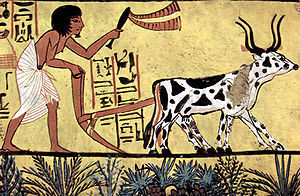
Last August, Stephen Colbert spent a hot day in the sun picking beans and packing corn on a farm in upstate New York, and he wants members of the US Legislature to know that farming is really, really hard work. So last Friday he testified, for five minutes, at a House Judiciary Subcommittee hearing on Protecting America's Harvest.
"My grandfather did not travel across 4000 miles of the Atlantic Ocean to see this country overrun by immigrants," he pointed out. American farms are "far too dependent" on immigrant labor, and there are only so many ways around that. We can stop eating fruits and vegetables. Or we can start picking our own beans and corn. There may be a tradition of great nations importing immigrants to do their dirty work, Colbert was quick to admit. "But this is America. I don't want a tomato picked by a Mexican. I want it picked by an American, then sliced by a Guatemalan, and served by a Venezuelan in a spa, where a Chilean gives me a Brazilian." History pretty much bears him out.
When Roman armies went to war, they captured slaves -- and put them in shackles, and sent them down to their farms. Marcus Porcius Cato "the Wise," who wrote the first book on farming, had to concede that chained gangs worked on some of his vines. But friends of the first Roman emperor, Augustus, pushed for a few reforms. Marcus Varro didn't like it when "whips rather than words" kept farm workers in line; but he didn't like it, either, when too many of them spoke the same language -- "a fertile source of domestic quarrels." And Lucius Columella, who recommended that "unfettered" slaves could be kept in cubicles that let in the midday sun, thought that most agricultural workers should be housed in rooms underground -- with light coming in through window slits "built so high from the ground that they cannot be reached" by hand.
Farm labor wouldn't have been much easier across the Near East's Fertile Crescent -- where agriculture is supposed to have originated, more than 10,000 years ago. As it turns out, the first farmers, like Adam and Eve, were reluctant to move out of Eden. Planters and harvesters probably put in longer hours than most hunters and gatherers, and their diets were almost certainly worse. They were more likely to be anemic, arthritic, toothless and short; and they were more likely to die of malaria, tuberculosis, smallpox, measles, influenza or plague. On the upside, they were able to store a lot of the grain they produced, and used it to support a literate, landowning class. Those landowners put up enormous bronze and cedar palaces, filled them with hundreds of "delightful" women, impressed visiting dignitaries like the Queen of Sheba with the food on their table, and wrote things like this: "In the sweat of your face you shall eat bread till you return to the ground, for out of it you were taken; you are dust, and to dust you shall return" (Genesis 3:19).
Lots of people keep ant farms. But how many people know that ants farm! All over the tropics, plant-ants cultivate gorgeous gardens of ant-plants -- full of orchids, bromeliads, anthuriums, philodendrons and so on. Ant workers collect soil, chewed vegetable fibers and fertilizer; they gather and sow seeds; they cut back invasive vegetation; and they defend against animal predators, to the death. Then they harvest their crops' pulp and nectar, feed their bloated, idle queen, and raise her young.
Other ants grow fungus. Fungus cultivation was probably invented just once in ants, round 45-65 million years ago in the Amazon rainforest; one ambrosia beetle, roughly 330 known species of termites, and 220 known species of Attines are now fungiculturalists. Even before taking off on her nuptial flight, Atta queens pack a wad of fungus in their infrabuccal pockets; then after they land and remove their wings, they excavate a nest and spit the wad into it. On the fungus that grows from that wad, a queen will lay millions of eggs. Some of the workers she produces will raise other workers. Some workers will defend the nest against predators. And hundreds of thousands of workers will become fungus laborers.
It took ants 50 million years, more or less, to invent agriculture; and it took us until our backs were against the wall, around 10,000 years ago, in the Ancient Near East. Why the wait? Because, as Stephen Colbert found out on a hot day in New York last August, farming is really, really hard work. And a lot of that corn ends up in somebody else's mouth.
References:
http://thecaucus.blogs.nytimes.com/2010/09/24/the-whole-truthiness-and-…
Bert Hölldobler and Edward O Wilson. 2008. Superorganism. New York: Norton.
http://www.amazon.com/Superorganism-Beauty-Elegance-Strangeness-Societi…
Ulrich Mueller et al. 1998. The evolution of agriculture in ants. Science, 281: 2034-38.
http://www.sciencemag.org/cgi/content/abstract/281/5385/2034
Laura Betzig. The imposition of agriculture.
http://laurabetzig.org/pdf/RomanPolygyny.pdf


